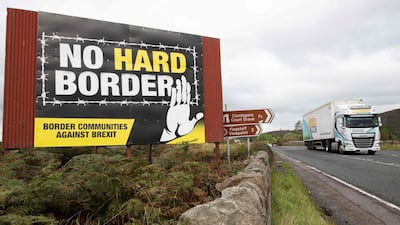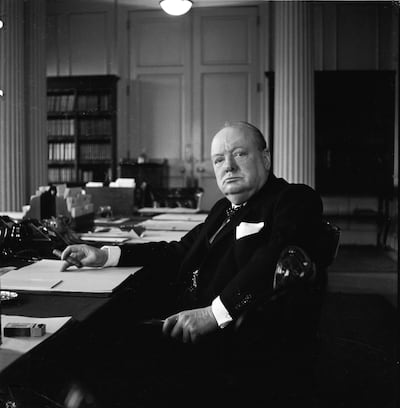British Prime Minister Boris Johnson cherishes his affinity with Winston Churchill, the man who held the same office in the 1940s and 50s. Like Mr Churchill, he mixed politics and journalism in his ascent and both rose and fell before seizing the crown. But the incumbent is ignoring one particular comment from his hero at his peril.
It is most unlikely that Mr Johnson would have gained entry to 10 Downing Street, the official residence and the office of the prime minister, two months ago had it not been for the gravest of national crises. And if his critics are to be believed, he is about to offer blood, toil, tears and sweat to a country desperate to achieve Brexit by quitting the European Union without a deal. Brexit has already shaved three per cent of British wealth since the referendum to leave the EU in 2016, according to the S&P 500 Index, which forecasts hard Brexit drops of 2.8 per cent in 2020 and 4.7 per cent in 2021.
The Churchill quote for Mr Johnson is not the one he made as prime minister to rally the troops during the Second World War. It is an excerpt from a speech in 1922 in which Mr Churchill, then secretary of state for the British colonies, made the argument for a bill that established the border separating Ireland from Northern Ireland as Dublin broke free from the United Kingdom following the Irish War of Independence. He said that Irish divisions had the power to “hold, dominate and convulse” the politics of Britain for generations.
“As the deluge subsides and the waters fall short, we see the dreary steeples of Fermanagh and Tyrone emerging once again," he said referring to two of the six Ulster counties that now make up Northern Ireland. "The integrity of their quarrel is one of the few institutions that has been unaltered in the cataclysm which has swept the world.”
Since known as the “dreary steeples” speech, Mr Churchill was pointing with realism to the awkward truths that trumped more ideological arguments. Fast forward to today, the Brexit project is immobilised in the face of the still-strong divisions in Fermanagh and Tyrone.
The arithmetic of the British parliament has been in hock to the Northern Irish Democratic Unionist Party for two years; Mr Johnson's Conservative party is in alliance with the DUP. Unfortunately, this is critically skewing the search for a deal. It is also unsustainable given that the British state adopted neutrality on the Irish border in 1998, making it invisible after 30 years of conflict in Northern Ireland through a peace agreement, called the Good Friday Agreement.
Mr Johnson now wants to recreate the border for trade and citizenship, with Irish divisions directly involved through a four-year rollover of border safeguards at the assembly in Belfast.
The problem with this proposal is that proponents for Brexit speak of a "Global Britain" that is more open to trade and commercial deals around the world. But it is an aspiration that has not yet taken on a tangible form, because at a time of protectionism, it seems scarcely believable that Britain can cut better deals than those enjoyed through Europe and sealed at the high point of globalisation.
What is tangible is the power of the Irish border. As Mr Churchill said, the Irish have an unrivalled ability to tie up the “vital strings” of British public life.
In the border towns, the topic of Brexit is inescapable. There are banners demanding an end to what is seen as a full spectrum threat to jobs, identity and security. For the moment there is an air of unreality. The UK remains a member of the EU and the cross-border exchanges continue uninterrupted.
The former peace negotiator Jonathan Powell, who was former British prime minister Tony Blair’s chief of staff when the Good Friday Agreement was hammered out, cautioned that Mr Johnson’s proposal is a smokescreen for a no-deal Brexit. “The point of this is not how long it takes a lorry to cross the border in Northern Ireland, that is not the issue,” he said. “The issue is identity. The Good Friday Agreement tried to solve the issue of identity by allowing people in Northern Ireland to live there and feel Irish or feel British or feel both.”

The inspiration for the Churchill speech was the rival church steeples in the border towns that often appear to compete for skyline dominance. People in this region still hold close to traditions of religion, sport and national allegiance, symbolised by those buildings.
Europe has positioned itself four square behind Dublin in the battle to defend the status quo and threatening the connection of the Northern Ireland population to Europe has reshaped views about Irish unity. This is another illustration of how Britain misread the fundamental power exerted by the situation in Ireland over Brexit.
On several levels, Mr Johnson has painted himself into a position of adventurism. Outside of the hardliners, he faces nothing but doubts. Even the British-appointed police chief in Belfast said last week that his forces would not protect the new customs facilities implied by the plan submitted by London.
The Brexit deadline at the end of the month means the clock is ticking ever louder. At the same time, the broken British political scene is in desperate need of renewal through a general election.
Both are currently lost somewhere along the rolling hills and twisting roads of the Irish borderlands.
Damien McElroy is the London bureau chief for The National


